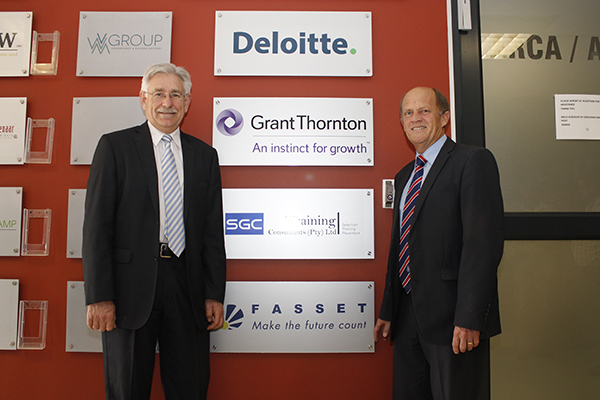
Programme Director: School of Accounting, Prof Hentie van Wyk, and
Dean: Economic and Management Sciences, Prof Hendri Kroukamp
excited about the unveiling of the Finance and Accounting Services
Sector Education and Training Authority (Fasset)
plaque at the School of Accounting.
Photo: Rulanzen Martin
The School of Accounting on the Bloemfontein Campus of the University of the Free State (UFS) held an unveiling ceremony for a Finance and Accounting Services Sector Education and Training Authority (Fasset) plaque. The plaque was unveiled by UFS Rector and Vice-Chancellor, Prof Francis Petersen, and Fasset CEO, Lesego Lebuso. This was in honour of Fasset’s partnership with the UFS and its contribution towards driving academic excellence through its Intrabas projects over the past few years.
Funding for teaching and learning initiatives
These projects support the development of black student enrolment and performance in Accounting Studies. During the previous year, Fasset gave the UFS R54 million in funding to support teaching and learning initiatives for 960 black Accounting students. These students were enrolled for BAcc, BCom(Acc), BAcc(Hons)/PGDipCA, and BCom(Hons in Acc)/PGDipGA studies. In the same year, a celebratory ceremony was held at the South Campus for 125 Fasset-funded students to celebrate their academic excellence.
Prof Hentie van Wyk, Programme Director: School of Accounting, said, “FASSET funding will give the Centre for Accounting (as it was then called) an opportunity to strengthen our current student-centred teaching model”. This seemed like a prophecy, because at the beginning of 2017, the class of 2016 BAccHons students achieved a 96% pass rate in the 2017 Initial Test of Competence (ITC) examinations of the South African Institute of Chartered Accountants (SAICA).
Millions contributed towards accounting degrees
In 2017, Fasset sponsored 114 students on the Bloemfontein Campus with full bursaries amounting to more than R20 million through the Intrabas bursary fund for degree qualifications in BAccHons, BComHons (Acc), BAcc, BComAcc and BComAcc Extended programmes, as well as the tutorial programme managed by the School of Accountancy. On the Qwaqwa Campus, Fasset has given more than R7 million worth of funding.
James Veitch, Senior Officer: School of Accounting, said, “A decision was made to rather fund less students so that they could be assisted with greater effect, and students who did not qualify for the bursaries, would still be assisted through the support programme.”